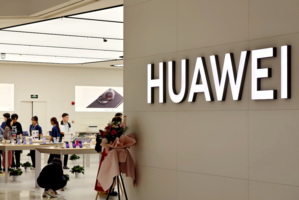White House’s Squeeze on Nvidia Chip Exports Is Turning Into a Win for Huawei
Listen to the full version

The lower-end artificial intelligence (AI) chips that Nvidia Corp. is exporting to China in order to skirt U.S. export controls are so underwhelming that local tech firms are turning to Huawei Technologies Co. Ltd.
It comes as the Chinese national champion begins to benefit from desperation among domestic tech firms to source the AI chips they need to train large language models (LLMs) for ChatGPT-like tools.

Unlock exclusive discounts with a Caixin group subscription — ideal for teams and organizations.
Subscribe to both Caixin Global and The Wall Street Journal — for the price of one.
- DIGEST HUB
- Nvidia's underpowered AI chips, restricted by U.S. export controls, drive Chinese tech firms to Huawei.
- The transition to Huawei chips is complex due to migration challenges from Nvidia’s ecosystem.
- Nvidia commanded 85% of the global AI chip market in 2023, while Huawei’s newer chips show promising performance improvements.
The lower-end AI chips Nvidia Corp. is exporting to China to circumvent U.S. export controls are perceived as inadequate by local tech firms, prompting them to turn to Huawei Technologies Co. Ltd. for their AI chip needs [para. 1][para. 2]. This shift is driven by Chinese tech firms' desperation to source AI chips necessary for training large language models (LLMs) similar to ChatGPT. However, the migration from Nvidia’s established AI ecosystem to Huawei's is daunting [para. 3].
Nvidia reported a strong financial performance with a notable 262% year-on-year increase in revenue to $26 billion for Q1 ending April 28. In its annual earnings report, Nvidia, which commands about 85% of the global AI chip market, identified Huawei as a formidable competitor in four out of five of its primary business categories [para. 4]. In August 2022, Nvidia stopped selling its high-end GPUs, A100 and H100, to the Chinese mainland and Hong Kong under directives from the U.S. government aiming to prevent the technology from reaching the Chinese military[para. 5].
Following additional U.S. export controls in October 2023, Nvidia introduced lower-end alternatives, L20 and H20 GPUs, to maintain its presence in China. Despite this, the H20 chips available in China are unable to meet the local tech firms' demands, compelling companies like Baidu Inc. and Iflytek Co. Ltd. to consider Huawei’s Ascend AI chips instead [para. 6][para. 7].
According to Counterpoint Research, in 2023, Nvidia held 85% of the AI chip market, followed by Intel Corp at 2% and AMD at 1% [para. 8]. AI chips primarily comprise GPUs, field-programmable gate arrays, and application-specific integrated circuits, while general-purpose chips like CPUs are becoming less useful for advanced AI tasks [para. 9].
Despite Huawei's Ascend 910B chip sometimes outperforming Nvidia's H20 chip in specific tests, Nvidia retains an edge with its NVLink interconnect technology, which can combine multiple chips to enhance computing power [para. 10]. Huawei plans to launch a more powerful Ascend 910C chip in the latter half of the year and expects to ship around 400,000 Ascend chips in 2024, a significant increase from last year [para. 11]. The anticipated Ascend 920 series aims to surpass Nvidia's H20 chip in both computing power and interconnect capabilities [para. 12].
Chinese tech giants like Baidu, Iflytek, and Meituan are already incorporating Huawei chips into their LLM projects. However, Iflytek’s Chairman Liu Qingfeng noted the additional time required to migrate to Huawei's platform and re-verify algorithms [para. 13]. The absence of a comprehensive software development ecosystem for Huawei chips poses another challenge. In contrast, Nvidia's CUDA Toolkit provides significant convenience to developers, enhancing its appeal [para. 14].
An executive from a Chinese internet giant mentioned reluctance among his colleagues to switch away from Nvidia's CUDA platforms due to the high costs and inconvenience of rewriting algorithms, alongside the scarcity of supportive development tools [para. 15].
- Nvidia Corp.
- Nvidia Corp. controls about 85% of the global AI chip market and experienced a 262% year-on-year revenue increase to $26 billion for Q1 of 2023. In response to U.S. export controls, Nvidia offers underwhelming lower-end AI chips like L20 and H20 in China. Nvidia's advanced A100 and H100 GPUs were previously restricted from Chinese sales. Despite competition from Huawei, Nvidia’s NVLink technology remains advantageous.
- Huawei Technologies Co. Ltd.
- Huawei Technologies Co. Ltd. is benefiting from Chinese tech firms' desperation for AI chips, as they switch from Nvidia due to U.S. export controls. Despite challenges like high migration costs and a less developed software ecosystem, Huawei's Ascend chips, including the upcoming 910C and 920 series, show promising performance. Major firms like Baidu, Iflytek, and Meituan are starting to adopt Huawei's chips for AI development.
- Baidu Inc.
- Baidu Inc. is among the local tech firms considering Huawei’s Ascend AI chips due to the insufficient computing power of Nvidia’s downgraded H20 chips. They have begun purchasing Huawei chips to develop their large language models (LLMs).
- Iflytek Co. Ltd.
- Iflytek Co. Ltd. has begun purchasing Huawei’s Ascend AI chips to develop their large language models (LLMs). They trained their Spark AI model entirely on Huawei Ascend 910B chips. However, Chairman Liu Qingfeng noted that adopting Huawei chips required extra time to transfer development tools to a new platform and re-verify algorithms.
- Meituan
- Meituan has begun purchasing Huawei chips for the development of its large language models (LLMs). This shift follows the introduction of less powerful Nvidia chips and the need for alternative AI chips with adequate computing power.
- Intel Corp.
- According to the article, Intel Corp. held a 2% share of the global AI chip market in 2023, making it the second-largest player behind Nvidia.
- AMD
- According to the article, AMD controls 1% of the global AI chip market as of 2023. This positions AMD well behind Nvidia, which controls 85% of the market. The article does not provide additional specific details about AMD’s activities or strategies in the AI chip sector.
- MOST POPULAR






